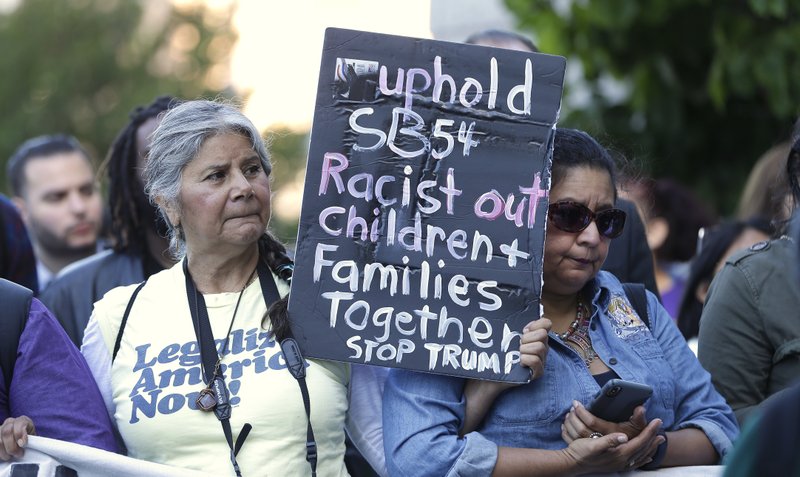SACRAMENTO, Calif. -- After repeatedly suing President Donald Trump's administration over U.S. immigration policies, California found itself in an unusual position Wednesday: defending state protections for people in the country illegally against a court challenge by the federal government.
The Justice Department wants U.S. Judge John Mendez to block three California laws, with government attorney Chad Readler saying it was clear they were passed to obstruct federal immigration enforcement.
"I'm not that clear and that convinced," said Mendez, who called the hearing a question-and-answer session. He was not expected to rule immediately.
California has been a leader in opposing Trump administration policies, filing more than 50 lawsuits, mostly over immigration and environmental decisions, and notching some significant court victories. The administration has fought back, sparring with the state's Democratic leaders and criticizing their so-called sanctuary policies.
Outside the courthouse in California's capital city, scores of people protested U.S. immigration policies. Some carried signs that said "Keep Families Together" and "Family Separation is UnAmerican," referring to the administration's "zero tolerance" policy on illegal border crossings that has separated children from their families.
Trump signed an executive order Wednesday ending the separations but not the policy that prosecutes all adults caught crossing illegally.
One of the laws the U.S. is targeting requires the state to review detention facilities where those people are held. Another bars law enforcement agencies from providing release dates and personal information of people in jail, and the third bars employers from allowing immigration officials on their premises unless the officials have a warrant.
California officials say their "sanctuary" policies promote trust between immigrant communities and law enforcement. The administration's lawsuit says the three laws allow dangerous criminals on the street.
The laws, two of which went into effect in January, follow Trump's promises to ramp up deportations. The administration has tried to crack down on sanctuary jurisdictions by restricting funding if they refuse to help federal agents detain and deport people in the U.S. illegally.
California, which this year became the second "sanctuary state," has resisted that move.
The federal government argues in its lawsuit that the U.S. Constitution gives it pre-eminent power to regulate immigration, and California can't obstruct immigration enforcement efforts. It says the law on detention facility inspections could lead private contractors to stop holding detainees, which the state disputes.
Mendez asked an attorney for California why the inspection law was necessary and whether it discriminated against federal immigration authorities.
State attorney Christine Chuang said the California attorney general wanted to "shed some light on" a particular set of detention facilities.
Mendez asked Readler, the government attorney, how a state review of such facilities would affect federal immigration enforcement. Readler said it's up to U.S. officials to detain and house people who crossed the border illegally, and states have no role in inspections.
In challenging the other state laws, federal officials say they need inmate information to safely take custody of people in the country illegally who are dangerous and need to be removed. The restriction on accessing businesses eliminates a "critical enforcement tool" to fight illegal employment, they say.
California officials argue that the administration is trying to assume powers that have long been understood to belong to states and cannot show that the state's policies are causing harm.
There is no evidence that the law barring release dates and personal information is causing more dangerous people to be freed, the state said in court documents.
It notes that the law restricting access to work sites explicitly authorizes compliance with inspections of employment records to make sure employees are allowed to work in the U.S.
Mendez, who was nominated to the bench in 2007 by Republican President George W. Bush, also will hear California's request to dismiss the lawsuit.
"The laws reflect the Legislature's best determinations on a number of critical issues, such as how the state provides for public safety, protects workers and the workplace, and safeguards all residents' rights," California said in court papers.
Information for this article was contributed by Sophia Bollag of The Associated Press.
RELATED ARTICLES
http://www.arkansas…">Trump order ends family separationshttp://www.arkansas…">U.S. officials to size up air base as detainee sitehttp://www.arkansas…">U.S. has 3 shelters for young detainees; 4th plannedhttp://www.arkansas…">Border-duty halt urged
A Section on 06/21/2018

